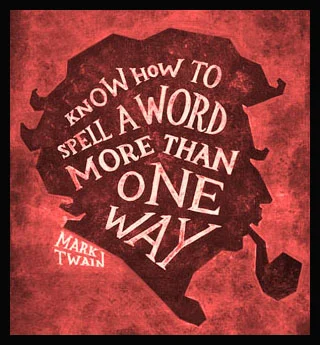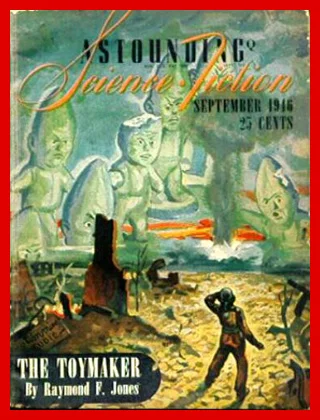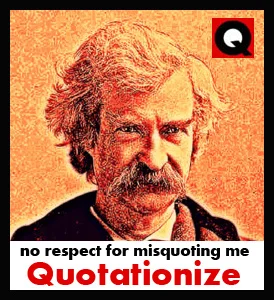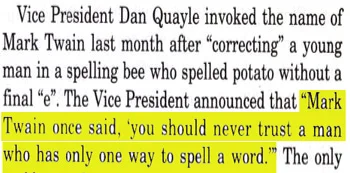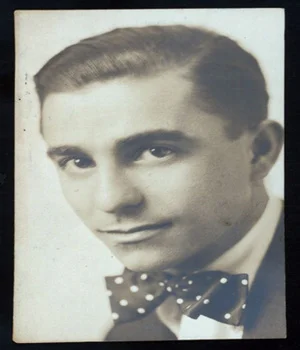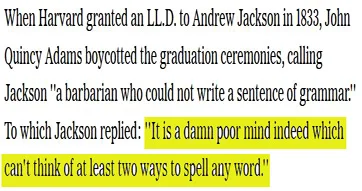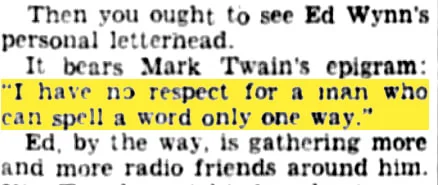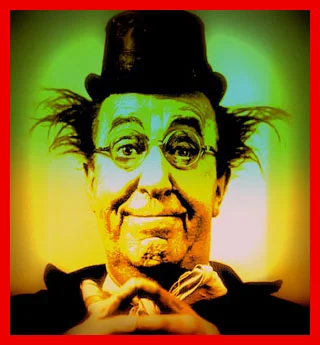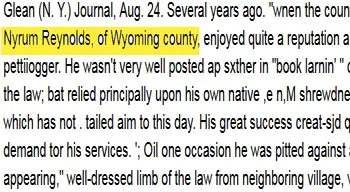The popular quote “Never trust a man who has only one way to spell a word” and its variants are NOT by Mark Twain.
Most of the versions are ascribed to Mark Twain, while a couple of them are credited to Andrew Jackson, Davy Crockett, Thomas Jefferson and Archibald Alexander Hodge.
Know How To Spell A Word More Than One Way
Now if you ask Google Search, “who said I respect a man who knows how do you spell a word more than one way?”
Instantly Google will spell out Mark Twain!
So is if you ask Google Search, “what did Mark Twain say about spelling?”
Goodness, Google still shows you this Mark Twain misquote from GoodReads:
“Anyone who can only think of one way to spell a word obviously lacks imagination”.
First and foremost, let’s me spell it for you.
Mark my words, the humorist and novelist Mark Twain never said or wrote this particular quip.
It is because there are so many versions of this quote, it is difficult to pinpoint the actual author.
Before we look into this wrongly-attributed quote, let’s check out some of Twain’s sarcastic comments about the English spellings.
Mark Twain On Spelling
I know Mark Twain wrote and spoke widely about the subject on spelling.
Twain had a strong view on spelling which can be found in his speeches and articles.
Here are some of Mark Twain takes on spelling or rather funny spelling:
“Look at the “h’s” distributed all around. There’s “gherkin.” What are you going to do with the “h” in that? What the devil’s the use of “h” in gherkin, I’d like to know. It’s one thing I admire the English for: they just don’t mind anything about them at all.” – Mark Twain
(Mark Twain’s Speeches, The Alphabet And Simplifies Spelling, Address At The Dinner Given To Mr. Carnegie At The Dedication Of The New York Engineers’ Club, December 9, 1907) source
“…look at the “pneumatics” and the “pneumonias” and the rest of them. A real reform would settle them once and for all, and wind up by giving us an alphabet that we wouldn’t have to spell with at all, instead of this present silly alphabet, which I fancy was invented by a drunken thief.” – Mark Twain
(Mark Twain’s Speeches, The Alphabet And Simplifies Spelling, Address At The Dinner Given To Mr. Carnegie At The Dedication Of The New York Engineers’ Club, December 9, 1907) source
(This speech was featured in The New York Times on December 10, 1907 titled “MARK TWAIN JEERS AT SIMPLE SPELLING; Has Fun with Mr. Carnegie’s System at the Dedication of the Engineers’ Club. PUTS HARD WORDS TO HIM One of Them Is Pterodactyl — The Ironmaster Elected to Honorary Place in Club for His Gift“)
“And we shall be rid of phthisis and phthisic and pneumonia and pneumatics, and diphtheria and pterodactyl, and all those other insane words which no man addicted to the simple Christian life can try to spell and not lose some of the bloom of his piety in the demoralizing attempt.” – Mark Twain
(Mark Twain’s Speeches, Spelling And Pictures, Address At The Annual Dinner Of The Associated Press, At The Waldorf-Astoria, September 18, 1906) source
(The quote is also found here)
“I don’t say we needed it, for I don’t see any use in spelling a word right, and never did. He spells cow with a large K. Now, that is just as good as to spell it with a small one. It is better. It gives the imagination a broader field, a wider scope. It suggests to the mind a grand, vague impressive, new kind of a cow. Superb effects can be produced by variegated spelling.” – Mark Twain
(The Shamrock Volume 12, Irish National Newspaper And Publishing Company, Limited, 1874, The Shamrock, Dublin Saturday, June 19, 1875, Mark Twain On Spelling, P. 608) source
(The quote is also found here.)
Related: There is this cautionary article on the perils of language simplification titled “MEIHEM IN CE KLASRUM” [pronounced as Mayhem in the Classroom] by Dolton Edwards.
(Astounding Science Fiction, September 1946, Vol. XXXVIII No. 1, New York: Street & Smith Publications, Inc., Articles, MEIHEM IN CE KLASRUM by Dolton Edwards, P. 94-95) source
Incidentally, this article is also mis-attributed to Mark Twain under the title “A Plan for the Improvement of English Spelling“.
By the way, here are the variants of this spelling quote:
“You should never trust a man who has only one way to spell a word.” – Attributed to Mark Twain
(Mark Twain Society Bulletin, Volumes XV, No. 2, Elmira, New York: Mark Twain Society, July, 1992, P. 6) source
(The quote is also found here.)
Note: This is taken from the then Vice President Dan Quayle who wrongly ascribed this never trust a man who has only one way to spell a word to Mark Twain.
“I don’t give a damn for a man that can only spell a word one way.” – No Attribution
(The Pittsburgh Press, June 26, 1946, P. 31) source
Note: The article mentioned the epigram I don’t give a damn for a man that can only spell a word one way is printed on the personal stationery of American vaudeville monologist Joe Laurie, Jr.
You can read Joe Laurie Jr.’s free 1953 book “Vaudeville From The Honky Tonks To The Palace” over here.
“Any man who can’t think of more than one way to spell a word can’t have too good an imagination ” – Attributed to Thomas Jefferson
(Getting the Most from WordStar and MailMerge:Things MicroPro Never Told You By M. David Stone, Englewood Cliffs, N.J.: Prentice-Hall, 1984, P. 139) source
“…it is a damned poor mind that cannot think of more than one way to spell a word.” – Attributed to Andrew Jackson
(Daily News, Friday, May 18, 1945, P. 21) source
Note: Here is The New York Times article titled “JACKSON ON SPELLING, KENNEDY ON YALE” on May 19, 1985, Section 4, Page 20, with the above quote.
This is another attribution to Andrew Jackson found in “The New England Historical and Genealogical Register”, July 1882.
“The variety of ways in which Groton Town-Clerks contrived to spell the same office is marvellous to behold. Evidently, like General Jackson, they despised a man who could spell a word in only one way.”
(The New England Historical And Genealogical Register, New England Historic Genealogical Society, For The Year 1882, Volume XXXVI, Boston: The Society’s House, 1882, Addendum: Hog Reeves or Hog Constables, July 1882, P. 273) source
“I have no respect for a man who can spell a word only one way” – Attributed to Mark Twain
(The Brooklyn Daily Eagle, New York, Sunday, May 15, 1932, column 2, P. 
Note: The article stated that the personal letterhead of American comedian Ed Wynn bears Mark Twain’s epigram: “I have no respect for a man who can spell a word only one way”.
“I think a man must be an awful poor speller if he can’t spell a word only one way.” – No Attribution
(Democrat And Chronicle, Saturday, July 19, 1890, P. 4) source
“He must be a very ignorant man who cannot spell a word in more than one way.” – Attributed to Davy Crockett
(Suggestions To Medical Writers By George M. Gould, Philadelphia: The Philadelphia Medical Publishing Company, 1900, Ch. III, Orthography, Punctuation, Pronunciation, P. 40) source
(The quote is also found here.)
“…I have a poor opinion of a man who can not spell a word more than one way!” – Attributed to A. A. Hodge (Archibald Alexander Hodge)
(Between Two Wars, 1861-1921: Being Memories, Opinions And Letters Received By James Mark Baldwin, In Two Volumes, Volume 1, Boston, Mass: Stratford Company, 1926, Vol. I, Memories, VI, A Winter At Oxford, P. 114) source
You can read the full book here.
More Than One Way To Spell A Word Quote
Now, let’s find out how does this spurious quotation, I have no respect for a man who can spell a word only one way or never trust a man who has only one way to spell a word come about.
I think it is a combination from these two different sources:
The first part of the quote is taken from Mark Twain’s autobiography.
“…I never had any large respect for good spelling. That is my feeling yet. Before the spelling-book came with its arbitrary forms, men unconsciously revealed shades of their characters and also added enlightening shades of expression to what they wrote by their spelling, and so it is possible that the spelling-book has been a doubtful benevolence to us.”
(Mark Twain’s Autobiography, Volume 2, With An introduction By Albert Bigelow Paine, New York & London: Harper & Brothers, 1924, Wednesday, February 7, 1906, Susy Clemens’s biography of her father.–Mr. Clemens’s opinion of critics, etc., P. 68) source
(The quote is also found here and here.)
The second part is probably taken from a news article published in The Olean Journal, August 24, 1855.
I could not locate this original article, but I managed to find the same article from another New York newspaper, The Buffalo Commercial, dated August 29, 1855.
It is about the lawyer Nyrum Reynolds of Wyoming county who was ridiculed for his poor spelling in court.
He retorted with this line:
‘the learned counsel on the other side finds fault with my writin’ and spellin’, as though the merits of this case depended upon such matters! I’m agin lugging in any such outside affairs, but I will say, that a man must be a great fool who can’t spell a word more than one way.‘
(The Buffalo Commercial, August 29, 1855, Spelling Word more than one Way, From the Olean (N. Y.) Journal, Aug. 24) source
Note: This particular line cannot be read properly here as it is from the OCR (optical character recognition) text.
You can read this full article from The Fremont Weekly Journal, October 5, 1855, column 7, on page 1.
(Here is another source of the story at: The Latter-day Saints’ Millennial Star, Volume XVIII, Liverpool: Orson Pratt, 1856, The Latter-day Saints’ Millennial Star, Saturday, December 8, 1855, Varieties, P. 784) source
This article when it was published from August to October 1855, the lawyer or barrister was Nyrum Reynolds of Wyoming county.
But in November 8, 1855 in “The Independent“, it not only changed from Nyrum Reynolds of Wyoming county to Hiram Runnels of Wyoming Pennsylvania.
The article had also been rewritten as the one published in the 1862 “The Ladies’ Repository, Volume 22” and the 1880 “Wit And Humor: A Choice Collection” by Marshall Brown.
By the way, there was this lawyer by the name of Nyrum Reynolds from Wyoming county.
But I am not certain about Hiram Runnels of Wyoming Pennsylvania.
The only Hiram Runnels I managed to locate online is Hiram George Runnels who was a U.S. politician from the state of Mississippi.
To conclude, never trust a man who has only one way to spell a word or I have no respect for a man who can spell a word only one way epigram is not by Mark Twain.
Bad spelling can be dangerous.
Let’s take the commonly misspelled words – your and you’re.
Some folks might write – “Your going to die,” when they meant to write, “You’re going to die.”
@_ryanpm_Bad grammar is scary #inverted #SometimesIRun #grammarlesson #tiktokteacher♬ Sometimes – Britney Spears
Okay, this might be an extreme example.
Whether you are writing an essay for school, an important email, or a resume for a new job, the spelling of the words you use matter a lot. After all, an email with a bunch of spelling errors can make you look lazy or unprofessional.
However, the English language is drawn from multiple sources, like Latin and Greek. Add in the nuances between American English and British English. And, it is easy to see how people get confused about all of the different spelling rules.
Luckily, it is easy to fix. Our phones and computers now come with built-in spell checkers, so we don’t have to turn to Merriam Webster, dictionary.com, or, heaven forbid, memorize all of the ways to spell words like our grandfathers and grandmothers had to do back in the old days pre-computers, Internet, and smartphones.
However, the best spellers – you know the ones who participated in the National Spelling Bee as kids – know autocorrect won’t always have your back and can sometimes feel like it’s actively working against you. For example, every time your phone autocorrects a certain word to “duck” or “ducking” in your texts.
In this post, we’ll share the basics of spelling, tips for improving your skills, and a few of the most commonly misspelled English words.
What does spelling mean?
Essentially, spelling is the forming of words or letters in the correct, accepted order. It boils down to a series of letters that make up a word.
Being able to spell words correctly is not this magical force or superpower. Anyone can learn to be a better speller if you learn these basic rules to guide English spelling.
Without diving into the specifics of each, here are 5 of the categories that most spelling rules apply to in English:
• Prefixes and suffixes
• Doubling letters
• Dropping and adding letters
• Verb forms
• Plurals
The dictionary uses both American and British spellings of words. For instance, “color” is the American form of the word “colour” in British spelling. Though neither spelling is incorrect, the spelling you’ll use will likely depend on where you live.
British and American spellings of words often follow different spelling rules, so you’ll need to be sure to follow the rules of whichever you use.
How to spell words correctly
There are many rules to follow when it comes to spelling, and so many of these rules aren’t set in stone. The rules aren’t always applied the same way to different words.
This is a recipe for confusion.
But don’t worry! By keeping a few hints in mind, you can improve your spelling without having to memorize a ton of rules.
• Start by sounding out the words. Not every word is spelled how it sounds, but the phonetic respelling will give you a good start.
• Remember the old saying, “I before E except after C.”
• Know that adding a prefix doesn’t change the spelling of a word.
• Look for smaller words within a larger, more complex word. If you can spell the smaller words, it can get you closer to the bigger picture.
• Know that the second vowel is silent when two vowels are next to each other.
• Make a list of your most commonly misspelled words and practice spelling them correctly.
• Use a memory trick! For example, this one to help you remember the spelling of island: an island is land in the ocean.
• When in doubt, use thesaurus.com as a shortcut to find synonyms of the words that are easier for you to spell.
Commonly misspelled words
Spelling is a fundamental skill, but it takes time and practice to get the rules right. Even then, some words are just trickier than others and are often misspelled.
People often have the same natural tendencies toward making similar spelling mistakes. Here are a few of the most common reasons that people misspell words:
• Not understanding patterns or blending
• Inability to apply phonetic rules
• Reversing certain letters
• Misunderstanding of the relationship between letter sounds
• Inability to put spelling rules into action
• Not adding an apostrophe in the right place – or even at all.
Not everyone struggles with the spelling of the same words or even makes the same type of spelling mistakes. However, some words in general are just more difficult for people to spell.
For example, this epic middle school teacher shares a bunch of commonly spelled words in this fun TikTok.
@queenbc84##inverted ##MyRoutine ##grammarcheck ##teachersoftiktok ##ela ##middleschoolenglish♬ original sound – Shuba
In addition, here are 20 more frequently misspelled words in the English language:
1.
Correct spelling: separate
Common misspelling(s): seperate
2.
Correct spelling: definitely
Common misspelling(s): definitly, definately
3.
Correct spelling: accommodate
Common misspelling(s): accomodate, acommodate
4.
Correct spelling: separate
Common misspelling(s): publically, pubically
5.
Correct spelling: government
Common misspelling(s): goverment
6.
Correct spelling: receive
Common misspelling(s): recieve
7.
Correct spelling: independent
Common misspelling(s): independant
8.
Correct spelling: acceptable
Common misspelling(s): acceptible
9.
Correct spelling: piece
Common misspelling(s): peice
10.
Correct spelling: grateful
Common misspelling(s): greatful
11.
Correct spelling: gauge
Common misspelling(s): guage
12.
Correct spelling: aluminium
Common misspelling(s): alluminnum, alluminum
13.
Correct spelling: possession
Common misspelling(s): posession, possesion
14.
Correct spelling: perseverance
Common misspelling(s): perserverance, perseverence
15.
Correct spelling: questionnaire
Common misspelling(s): questionaire, questionnaire
16.
Correct spelling: rhythm
Common misspelling(s): rhytm, rythm
17.
Correct spelling: maintenance
Common misspelling(s): maintanence, maintenence, maintnence
18.
Correct spelling: exceed
Common misspelling(s): excede
19.
Correct spelling: entrepreneur
Common misspelling(s): entepreneur
20.
Correct spelling: misspell
Common misspelling(s): mispell
***
In sum, the best way to improve your spelling? Practice, read, and write often. You could also try Writer! Start a free trial today and keep your spelling game sharp with the power of an AI writing platform.
More resources
Download Article
Download Article
- Spelling Help
- Small Words
- Big Words
- Spelling Rules
- Q&A
- Tips
- Warnings
|
|
|
|
|
|
Spelling the English language can be a challenge. It typically, however, involves nothing more complicated than memorization. You can be a successful speller if you’re willing to study and practice the art and science of spelling. Reading, using a dictionary and playing online word games are all helpful. Sounding out words and breaking them into parts are good skills to develop. Learning spelling rules is important, too, but the many exceptions to those rules can be rather frustrating. In the end it comes down mainly to memorization. This article will help you with the daunting task of spelling English words.
Spelling Help
-
1
Learn the letters and sounds of the alphabet. This will allow you to recognize them when you hear them within words. Use flashcards or ask a tutor to help you connect letters to their sounds. Practice making those connections in your mind. This will help you recognize the appropriate letters when you sound out words.[1]
- Ask a family member or friend to help you learn the letter sounds.
- As an alternative you can watch videos online that show you how to say each letter. Here’s one to get you started: https://www.youtube.com/watch?v=pyKdUpJQBTY
-
2
Identify the sounds as you slowly say a word you want to spell. It helps to say the word more than once.[2]
Stretch out the word to help you identify each sound in it. If you say the word too quickly, you may miss a letter sound.- If the word has more than one syllable, separate them mentally or in writing. Pronounce each syllable individually.
- For example, the word «probably» is very easy to misspell if you pronounce it «probly.» Saying it slowly — «prob-ab-ly» — can help you hear the sounds in each syllable.
Advertisement
-
3
Split up each letter sound in the word to help you hear them. It’s helpful to draw an underline on your paper for each sound that you hear. Don’t worry about what the word is supposed to look like. Just focus on the sounds you hear when you say the word. Then think about which letter or letters might make each sound.
- It helps to count out the number of sounds in the word. For example, let’s say you want to spell the word «tiger.» You might hear four sounds: t-i-g-er.
-
4
Spell out each sound. Write out the letter sounds you hear for each sound in the word. Then put the sounds together to form the word. Check your work by sounding out the word again while you look at your spelling, letter by letter.[3]
- For a harder word you may need to refer to the spelling rules instead of just sounding the word out.
Advertisement
-
1
Divide a big word into smaller words, syllables or parts. Say the word slowly, looking for smaller words within it, such as «grand» and «father» in «grandfather.» If you can’t find smaller words, focus on the syllables or patterns within the word. This makes it easier to spell the word, because you can more easily sound it out. You may already know how to spell the smaller words. Here are some ways to break down big words:[4]
- Break larger words into smaller words. For example, “baseball” is an example of what’s known as a «compound» word: it can be broken into smaller words, in this case «base» and «ball.»
- Break up non-compound words into syllables. For example, you would break up “hospital” into three syllables this way: hos-pi-tal.
- Break the word into convenient parts. For instance, “impossible” can be broken into im/poss/ible. Here you’re not breaking the word into syllables, just artificial segments. The idea is to consider a longer word in shorter sections just so the task of spelling it becomes a bit easier.
-
2
Look for a prefix to make spelling easier. A prefix is a short series of letters that can be added to the beginning of a word to change its meaning. The spelling of a prefix never changes, so just memorize its spelling.[5]
Here are the most common prefixes:[6]
- Mis, as in “misspell”
- Dis, as in “disagree”
- Un, as in “unlikely”
- Re, as in “rewrite”
- Anti, as in “antifreeze”
- De, as in “dehydrate”
- Non, as in “nonsense”
- Fore, as in “forecast”
- In, as in “injustice”
- Im, as in “impossible”
- Note that most of these prefixes mean «not.»
-
3
Notice whether the word has a suffix. A suffix appears at the end of a word and changes its meaning. The spelling of a suffix never changes, so memorize it. Here are the most common suffixes:[7]
- Ed, as in “spelled”
- Ing, as in “spelling”
- Ly, as in “likely”
- Ful, as in “beautiful”
- Able, as in “comfortable”
- Ible, as in “possible”
- Er, as in “higher”
- Ment, as in “enjoyment”
- Ness, as in “happiness”
- Est, as in “biggest”
-
4
Spell out each part of the word, and then put them all together. If you know how to spell smaller words or segments within the word, such as a prefix, spell those first. Then look for common letter patterns, and sound out each segment to help you spell them. Write out the letters you hear.
- Check your spelling by sounding out the word. Would the spelling you’ve used sound right?
- For example, when spelling «remind,» you could break it down into «re» and «mind.» If you know how the prefix «re» is spelled, write that first. Then you just need to spell «mind.» If you aren’t sure how to spell it, you could sound out «mind» as «m» and «ind.» Then select the letters as you hear them.
Advertisement
-
1
Recognize that some spelling rules have exceptions. English is a tricky language, because many of the rules have exceptions. Certain spellings simply don’t follow the rules. However, knowing the rules will help you most of the time.[8]
- While it helps to know the exceptions, don’t try to learn them all at once. If you absorb them gradually, they won’t seem so frustrating.
- Your best bet is simply to memorize the spellings that don’t conform to the rules.
-
2
Remember the general rule that «i» precedes «e» much of the time except when they follow the letter «c.» This well-known rule pertains to words such as die, friend, yield, patient, convenience, piece and receive (where «ei» follows «c.») Unfortunately, there are many words that disobey this rule, such as weight, height, sleigh and reins. When the rules fail, you’re left with memorization.[9]
- If the i/e combination is followed immediately by a «gh» (as in weight or height), the «e» precedes the «i.» It’s another exception you simply have to memorize.
- A few other words to memorize (that don’t follow the «i before e» rule) include “either,” «neither,» “leisure,” “protein,” “their,” and “weird.”
-
3
Pay attention to other double vowels. Remember the rhyme, “When two vowels go walking, the first one does the talking.” When two vowels are next to each other, often you pronounce only the first vowel. This makes it easier to place two vowels in the right order. (Of course, you have to remember that two vowels are called for in this case.)[10]
- For example, you hear the “o” sound in the word “coat,” so you know the “o” comes first. You hear the “e” sound in “mean,” so you put the “e” first.
- Once again there are exceptions to this rule that you will need to memorize, such as “you,” “great,” and “phoenix.”
-
4
Learn the “c” sound patterns. The letter “c” can be pronounced hard, as in “cat,” or soft, as in “cell.” Usually if the letter following the «c» is «a,» «o,» «u» or a consonant, the «c» is hard. Examples include cat, cot, cut, cute and clue. If the following letter is «e,» «i» or «y,» the «c» is usually soft. Examples include celery, citation and cycle.[11]
-
5
Look for consonant letter combinations where one letter is silent. English words sometimes have a letter that is silent, typically a consonant next to another consonant at the beginning of a word. Here are common letter combinations where one letter is silent:
- Gn, pn, and kn: These letter combinations all have an “n” sound. The other letter is silent. Examples are «gnaw,» «pneumonia» and «knock.»
- Rh and wr: Both of these combinations have an “r” sound. For example, rhyme and «write.
- Ps and sc: These combinations both make an “s” sound, as in psychic and science.
- Wh: Sometimes «wh» sounds like «h,» as in «whole.»
- «Gh» is often silent, especially if it comes after “i.” This happens in words like «right» and weight.» Sometimes “gh” makes an “f” sound, as in “cough” or «tough.»
Advertisement
Add New Question
-
Question
When putting words in alphabetical order ex. Boy’s or boys’ which one comes first?
It is boy’s boys boys’. «Boy’s» is two words (or a possessive), and the real word is ‘boy’. Thus, it comes before the plural form which includes an ‘s’. Further, the next form is multiple boys, with the addition of a possessive, so that is last. Do you see? Most simple comes first. Just like you’re comes before your because the base word is you.
-
Question
Should it be «all to well» or «all too well»?
You would use «too» in this case.
-
Question
How do I spell sincerity?
You’ve spelled it right.
See more answers
Ask a Question
200 characters left
Include your email address to get a message when this question is answered.
Submit
Advertisement
-
Reading and writing are often the best ways to build up your spelling skills. Don’t worry about being perfect! It’s true that misspellings can hurt your chances of impressing someone in a formal or academic setting. However, in more casual communications, perfect spelling may not matter much. Just do your best. No one can ask more of you.[12]
-
Once you know how to spell a word properly, you can use that word to help you spell similar words in the future!
Show More Tips
Thanks for submitting a tip for review!
Advertisement
-
Keep in mind that some words, such as «color/colour;» «gray/grey;» «checkered/chequered» and «theater/theatre» can be spelled (or spelt) more than one way. In such cases neither spelling is wrong, but one may be preferred in American, British, Canadian or Australian English.
-
Don’t rely on a spell-checker tool to find all of your errors. It may not catch all misspellings, and it won’t identify properly spelled words that have been used incorrectly.
Advertisement
References
About This Article
Article SummaryX
To spell a word, say it to yourself slowly and separate each syllable so it’s easier to pick up on all of the different letters. If it’s a particularly big word, try dividing it into smaller words or parts so it’s easier to spell. Also, try to memorize the spelling of common prefixes, like «Mis» or «Dis,» and suffixes, like «Ed» and «Ing,» so it’s easier to spell words that use them. You can also use online flashcards to help you memorize the spelling of words that you struggle with. To learn how to use spelling rules to help make spelling easier for you, scroll down!
Did this summary help you?
Thanks to all authors for creating a page that has been read 949,044 times.
Did this article help you?
How to spell words is one of the basic problems that most students struggle with!
Most of the students do not see a problem when it comes to the pronunciation of words. Actually, they can easily tell you even of the most difficult vocabulary.
However, the problems come in when it comes to the spelling of those words.
Most of the students find it a challenge pronouncing certain words in English. This issue impacts their learning as they are not able to learn faster the content of their studies and therefore to waste more time.
Students who learn how to spell words correctly, most of the time find learning easy, and they catch up with things faster.
Wastage of time to learn the spelling of hard words do cost most students a great deal. However, there are some of the kids who are leading thinkers but slow in spelling.
The History of English Spelling Words
The spelling of words is the ability to state the letters that constitute a particular word. The writing came up in the 7th century, and they used the Roman alphabets, later on, St Augustine brought church Latin.
Since then spelling and language have been changing over time. Since then people tried really hard to spell words without mistakes.
The spelling system used currently dates back to 1400 where a poet by the name Chaucer pioneered it. The history of spelling in English examines the stages of the levels that it has gone through to where it is today.
What Makes Spelling so Difficult for Some Kids?
It takes them much energy and time, and this can result in low self-esteem for learners. They are often too afraid of spelling tests.
Complex Pronunciation
Most of the English words that bring spelling challenges to students are words that contain phonemes that use less graphene mapping.
Some of the factors that determine the difficulty in pronunciation of certain words include lower frequency words.
When you come across a nutshell every day, you get used to it. You can quickly master its spelling, but there are those specific words that are rarely used in our conversation. Therefore getting to know the spelling becomes a challenge.
Words Originating from Different Language
Another factor is the name origin. The English language has the tendency to allow foreign words into it.
The foreign words are usually hard to spell because it has a different source and therefore even the pronunciation is different.
Silent Letters are Silent Killers!
Words with silent letters also bring a challenge when it comes to spelling.
How do you know how to spell a word?
You know how to spell a word by first pronouncing the word, then from there is when you can go deep and spell each letter.
The words that have silent letters brings difficulty when it comes to spelling them. Because the silent letter is not pronounced and therefore there is the tendency of leaving the note behind.
Longer Words are Always a Problem
Some of the words are long, very long!
Therefore they contain more characters. So when it comes to their pronunciation, an individual has to spell a long sequence of letters and it is through this that chances of making an error high.
It is not difficult to master how to spell a word that is short because one can quickly learn the letters.
Not Everyone Learns at a Constant Pace
Individual differences may also contribute to how one spells a word.
Some people do not find any difficulty in pronouncing certain words because they encounter it in their day to day studies.
But there are those that find it difficult because their education does not contain such terms and therefore it comes as a new word to them.
Tips to Master Spell Words
There are several tips on mastering how to spell words easily in English. You can visit lifehack to get more tips.
Identify the Words You Often Misspell
One is by creating your challenge in the construction of sentences and writing them. Identify the words that usually challenge you when it comes to their spelling.
After that, you can sit and construct sentences using those words so that you become used to their spellings.
The practice will increase your frequency of encounter with these words, and you will be able to find their spelling easy.
Dictations Help, A Lot!
Another way in which you can quickly know how to spell a word is by use of dictation. At SpelQuiz, you can find dictation for adults, as well as, dictation for class 2.
You can assign your friend the task of dictating to you English words that you find difficult to spell as you write them.
By dictation, you will be able to gain confidence, and you will learn the spelling of the words slowly. After misspelling those words, you can always repeat them again until it becomes part of you.
Spelling Bee Mock-Ups
In schools, students can come up with a competition on how to spell words in English and those who score highly should be awarded.
Think of it as a mini Spelling Bee with your friends.
Now you can take part in Spelling Bee online too and make new friends! Check out the SBO section on SpellQuiz today! This online game help you with simple 3rd grade spelling bee words to 12th grade spelling bee words.
Two groups should be formed, and it becomes group A against group B. Then there should be a person to pose the questions to the two groups so that they compete and every right word spelled should earn the team some points.
It will be the work of the person in charge to pronounce those words to the groups, and the students should be in a position to spell the phrase.
After the exercise, the two teams should be rank and the best team awarded. Then correction has to be highlighted so that the students learn where they made mistakes.
Listening, Speaking, Spelling!
Another skill of mastering spelling of words is by spelling the phrase aloud. It would enhance the listening skill of the kids as well.
When you spell a word aloud, your ears get used to hearing the word, and therefore it ends up being part of you.
By spelling words aloud you can also be able to detect errors made. Because they will automatically not sound correct and you will realize your mistake.
A Better Reading Culture
Developing a healthy reading culture also contributes to the spelling of English words correctly.
When you develop a reading culture, you will come to many terms and vocabularies. By doing so every time you will be able to master the spelling of those words, and it will improve your grammar.
Try this vocabulary check tool tester to understand your current skill level!
Final Words
In conclusion, it is clear that there are a lot of challenges encountered in how to spell words in English. But you can overcome all these problems by mastering some skills and practicing the spelling of those words.
For more information on how you can improve your spelling, you can visit SpellQuiz.com.
Mark Twain? Nyrum Reynolds? Hiram Runnels? Andrew Jackson?
Dear Quote Investigator: I sometimes have difficulty spelling words correctly. But I take comfort in the magnificent statement attributed to Mark Twain:
I don’t give a damn for a man that can only spell a word one way.
Actually, I used to take comfort in those words, but recently I have found several other versions of this quip:
Anyone who can only think of one way to spell a word obviously lacks imagination.
I have no respect for a man who can spell a word only one way.
Never trust anyone who can’t spell a word more than one way.
All of these quotations are credited to Twain. But now I have become suspicious. Did Twain say any of these sentences? Could you investigate this puzzle?
Quote Investigator: The statement has never been found in the writings or speeches of Mark Twain. Yet, Twain has been connected to the remark for more than one hundred and thirty years. The earliest linkage known to QI consisted of an unsupported attribution published in 1875:[1] 1875 November, The Illinois Schoolmaster, Spelling, Page 380, Volume VIII, Number 90, Normal, Illinois. (Google Books full view) link
Mark Twain says that he must have little genius who can’t spell a word in more than one way.
Since Twain lived to the age of 74 in 1910, the remark was credited to him for a few decades while he was alive. The TwainQuotes website of Barbara Schmidt includes an excellent webpage on the theme of spelling. However, none of the quotes featured match the joke precisely. The attitudes expressed do help to explain why contemporaries were willing to attribute the joke to Twain. Here is an example from Twain’s autobiography:[2] TwainQuotes website editor Barbara Schmidt, Spelling webpage, Accessed 2010 June 25. link[3] 1925, The Writings of Mark Twain: Mark Twain’s Autobiography by Mark Twain, Page 68, Gabriel Wells. (Google Books snippet view only) link
I never had any large respect for good spelling. That is my feeling yet. Before the spelling-book came with its arbitrary forms, men unconsciously revealed shades of their characters and also added enlightening shades of expression to what they wrote by their spelling, and so it is possible that the spelling-book has been a doubtful benevolence to us.
Interestingly, the earliest known versions of the comical remark were not attributed to Mark Twain. Instead, two individuals with curiously similar names were each separately credited: Nyrum Reynolds and Hiram Runnels. The first version that QI has located was an anecdote about Nyrum Reynolds dated August 31, 1855. The spelling in the following excerpt was present in the original text. Boldface has been added:[4] 1855 August 31, Jamestown Journal, Spelling Words More Than One Way, Page 3, Column 2, Jamestown, New York. (GenealogyBank)
Several years ago, “when the country was new,” Hon. Nyrum Reynolds, of Wyoming Co., enjoyed quite a reputation as a successful pettifogger. He wasn’t very well posted up either in “book larnin’” or the learning of the law; but relied principally upon his own native tact and shrewdness–his stock of which has not failed him to this day. His great success created quite an active demand for his services.
On one occasion he was pitted against a “smart appearing” well-dressed limb of the law from a neighboring village, who made considerable sport of a paper which Reynolds had submitted to the Court, remarking among other things, that “all the law papers were required to be written in the English language, and that the one under consideration, from its bad spelling and penmanship, ought in fairness therefore to be excluded.”
“Gen’l’men of the Jury,” said Reynolds, when he “summed up”—and every word weighed a pound—”the learned counsel on the other side finds fault with my ritin’ and spellin’ as though the merits of this case depended upon sich matters! I’m again lugging in any sich outside affairs, but I will say, that a man must be a d—d fool, who can’t spell a word more than one way.” The Jury sympathized with Judge R. and rendered a decision in favor of his client.—[Olean Journal.
Here are additional selected citations in chronological order.
In November 1855 the anecdote was retold, but the main character was changed to the Hon. Hiram Runnels from the Hon. Nyrum Reynolds. The location was still referred to as Wyoming, but Hiram Runnels resided in Wyoming, Pennsylvania, and Nyrum Reynolds was probably located in Wyoming County, New York. Here is an abbreviated excerpt of the story as published in Harper’s Magazine:[5] 1855 November, Harper’s Magazine, Vol. 11, No. 66, Editor’s Drawer, Page 860, Harper’s Magazine Company. (Google Books full view) link
Some years ago the Hon. Hiram Runnels, of Wyoming, Pennsylvania, had quite a reputation as a pettifogger. His knowledge of books was very small, and his main reliance was upon his own tact and shrewdness, which rarely failed him, and lasts to this day. … . “I’m agin luggin’ in any sich forin’ affairs, but I will say that a man must be a great fool who can’t spell a word more than one way.”
Another popular choice for attribution has been Andrew Jackson, seventh President of the United States and famed General. Here is an instance in 1882:[6] 1882 July, The New England Historical and Genealogical Register, Addendum: Hog Reeves or Hog Constables, Page 273, Published Quarterly by the New England Historic Genealogical Society, Boston. link
The variety of ways in which Groton Town-Clerks contrived to spell the same office is marvellous to behold. Evidently, like General Jackson, they despised a man who could spell a word in only one way.
Ralph Keyes writing in the Quote Verifier says:[7] 2006, The Quote Verifier by Ralph Keyes, Page 206-207, St Martin’s Griffin, New York. (Verified on paper)
Jackson was widely lampooned for his intellectual limitations, with lots of inane remarks getting put in his mouth (e.g., “Elevate them guns a little lower.”). He was particularly ridiculed for being a poor speller.
Jackson died in 1845 and the citations QI has found that contain the spelling quip appeared after his death.
In conclusion, QI conjectures that this remark was created as the punch line of a fictional anecdote about spelling. It is not clear whether the Nyrum Reynolds or the Hiram Runnels tale was constructed first. Twenty years later the remark was reassigned to Mark Twain. Later still the expression was attributed to Andrew Jackson and other famous individuals. However, the supporting evidence for an ascription to Twain or Jackson is very weak.
Image Notes: Mark Twain photo portrait in 1871; Andrew Jackson daguerrotype in 1845; both via Wikimedia Commons. Letter tiles from PublicDomainPictures at Pixabay.
(Great thanks to Theric Jepson who asked about this topic. Special thanks to Joel Berson, and Stephen Goranson who located some early citations for the anecdote. Many thanks to Victor Steinbok who located the valuable 1875 citation.)
Update History: Parts of the article were rewritten on June 22, 2014. The footnotes were switched to numeric form.

